Florida Digital Bill of Rights (FDBR) — A Complete Guide for 2025
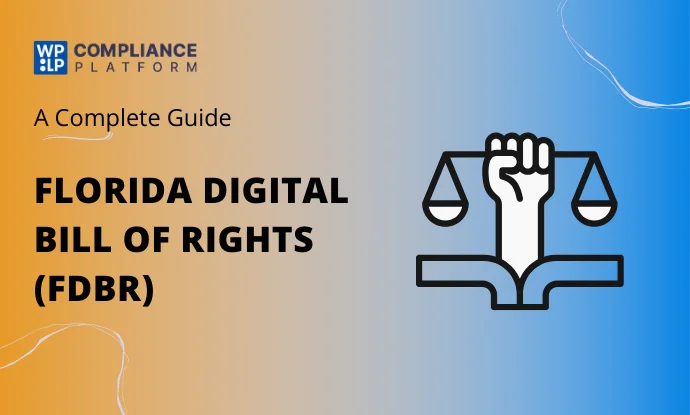
Did you know that Florida set new standards with the Florida Digital Bill of Rights (FDBR), effective July 1, 2024?
This is the tenth state-level bill in the United States, with the new legislation part of a wave of legislative sweeping through the nation during 2023, joining Iowa, Indiana, Tennessee, Montana, and Texas.
The Florida Digital Bill of Rights was unique in providing protections for children, regulating social media, and raising awareness of the implications that technology may have on communications.
It brings new meanings and enforces compliance thresholds uniquely applied to large players such as tech companies.
Florida’s move places it alongside other states, with growing state-level compliances on privacy happening without a national consensus.
In this overview, we’ll break down the Florida data privacy law, including its key provisions, applicability, and the steps businesses need to take to ensure compliance.
- What is the Florida Digital Bill of Rights (FDBR)?
- Basic Terms and Definitions Under Florida Digital Bill of Rights?
- What Does the FDBR Include?
- FDBR vs Other State Laws
- Who Needs to Comply With The Florida Data Privacy Law?
- How Can Businesses comply with the Florida Digital Bill of Rights?
- Penalties and Fines for Non-compliance of Florida Digital Bill of Rights (FDBR)
- FAQ
- Conclusion
What is the Florida Digital Bill of Rights (FDBR)?
The Florida Digital Bill of Rights protects not only digital privacy but also personal data for Florida’s 21 million residents while imposing specific data privacy requirements on businesses conducting business within the state or providing products or services directed toward Florida consumers.
These businesses often get consumers’ personal information when operating. What makes this law unique is its deep concern for giant technology companies, new consumer technologies, and online social media.
Florida defines a consumer in terms that are similar to every other state, referring to residents acting for purposes other than business or employment.
Opt-Out Approach
The Florida Digital Bill of Rights adopts an opt-out approach, allowing organizations to collect and process information without needing to seek direct consent from consumers.
However, these organizations must still inform consumers about how they collect and process their information, the purposes behind these actions, and the rights consumers have to exercise regarding their data.
Disclose how you collect data, clearly explain its intended uses, and identify the third parties receiving the information.
Consumers must have clear opt-out opportunities to prevent data collection for purposes of targeted advertising, sales, or profiling. Both data controllers and processors shall adopt reasonable security measures.
Obtain prior consent for processing sensitive personal data or handling information about minors.
Florida extends the definition of a child to include anyone under the age of 18. The more traditional under-13 age limit that most other states employ.
Basic Terms and Definitions Under Florida Digital Bill of Rights?
The Florida Digital Bill of Rights (FDBR) has definitions that are unique to other U.S. data protection acts, so it is essential to know them to ensure conformity.
Defining the Florida Digital Bill of Rights under these essential terms
- Child: Any consumer below 18 years of age.
- Consent: An unambiguous, affirmative action that demonstrates that a consumer has given their willing, informed, and particular consent to the processing of personal data. It can be either in writing or made through an electronic declaration and may encompass any other statement which, by its very nature, is clear enough. This is far from silent acceptance of general terms of use policy, endorsements through mouse movement or muting, and agreements that exploit users’ default behavior, labeled dark patterns.
- Consumer: A person residing in Florida and undertaking any action for a personal or family purpose and not for business or commercial purposes.
- Business: An entity with defined characteristics, including firms generating annual revenues exceeding $1 billion, companies engaging in data-driven advertising, companies owning voice-controlled intelligent devices, or stores that carry more than 250,000 applications. The term scope also includes businesses that have engaged or engaged in the exercise of control over other businesses.
- Dark Pattern: The Federal Trade Commission defines a user interface as one designed to manipulate or impair user decision-making or autonomy.
- Personal Data: Any information that can be related to an identified or identifiable natural person, such as pseudonymous data, when further processed together with other data or publicly available data.
- Processing: Any action or operation on the personal data performed automatically or not
- Sensitive personal data: Information or data that is about an identified individual and contains sensitive information, including, but not limited to, medical or biometric information, and does not include de-identified or public information.
These definitions lay the basis for compliance under Florida data privacy law and point out the focus on consumer protections and considerations for technology.
What Does the FDBR Include?
The Florida Digital Bill of Rights (FDBR) targets three core privacy-related areas that concern Florida residents and the state as well :
- Consumer Privacy: One article deals with the rights of individuals regarding the collection, processing, and use of their personal data by data controllers while acting in a personal or household capacity.
- Government Restrictions: The second article bars government employees from using their office or state apparatus to delete or modify content or an account of a person on a social media website.
- Children’s Online Protection: A third article sets up protections for a child’s online information. Notably, the Florida Digital Bill of Rights distinguishes between “personal data” and “personal information,” applying each term to specific areas of the law:
- Personal Data: Deals with the collection, processing, and management of information by data controllers with respect to Florida residents.
- Personal Information: Relates to safety measures for protecting children under 18 in online spaces.
FDBR vs Other State Laws
Florida’s FDBR follows the mold of other state laws, including the California Consumer Privacy Act (CCPA) and Virginia Consumer Data Protection Act (CDPA), though it also has some unique features.
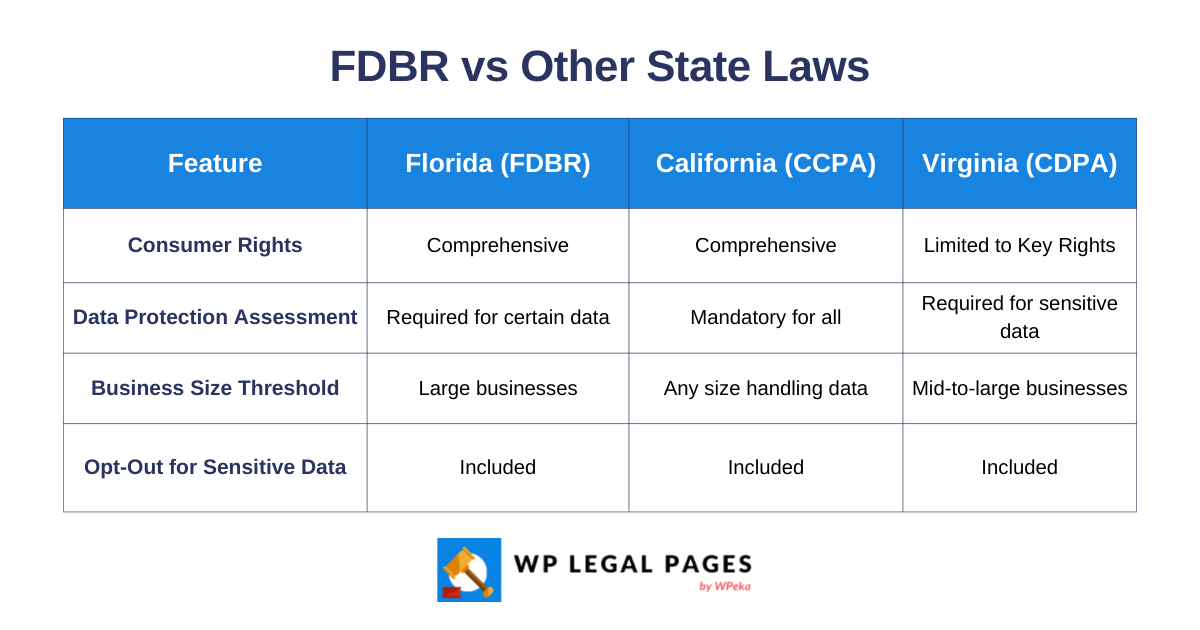
Experts consider Florida’s law mid-range, balancing the strict regulations of California with the relaxed provisions of Virginia, making it both flexible and strong.
Who Needs to Comply With The Florida Data Privacy Law?
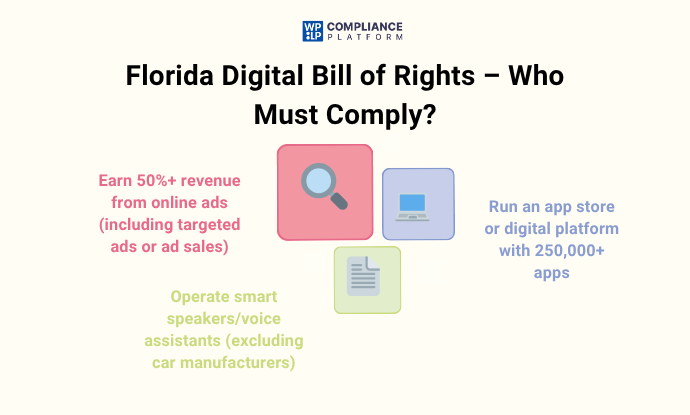
Florida Digital Bill of Rights applies to businesses operating in Florida or providing products and services to Florida residents. Its compliance criterion is somewhat different from other U.S. data privacy laws, which usually target a specific type of organization.
To be in compliance with the Florida data privacy law, a company should:
- Have more than $1 billion in global gross annual revenue,
- And meet at least one of the following conditions:
- Derive 50% or more of global gross annual revenue from online advertising, including targeted ads or the sale of advertisements.
- Operate a smart speaker or voice command service with a built-in virtual assistant linked to a cloud service. It activates using hands-free voice commands. However, manufacturing automobile companies or their subsidiaries exclude these devices tied to their automobile.
- Manage an app store or digital distribution platform that allows access to or download of more than 250,000 software applications.
Revenue Threshold Highlights
The $1 billion in revenue threshold is unique in that it singles out more extensive businesses. To put it into perspective, only the California Privacy Rights Act (CPRA) has a threshold of $25 million, while newly introduced legislation, such as Tennessee’s Information Protection Act (TIPA), has no revenue-only threshold.
Affected Businesses
In Florida, less than 6,000 businesses have revenues above $1 billion, and there are other specific elements that further qualify the field. The Florida Digital Bill of Rights also has particular designations for large tech companies generating big dollars in online advertisements, ones with smart voice-activated devices, or those running large app distribution sites. This aligns again in focus areas where companies like Apple and Google lead in these markets, adding even additional requirements not part of any existing state privacy law.
How Can Businesses comply with the Florida Digital Bill of Rights?
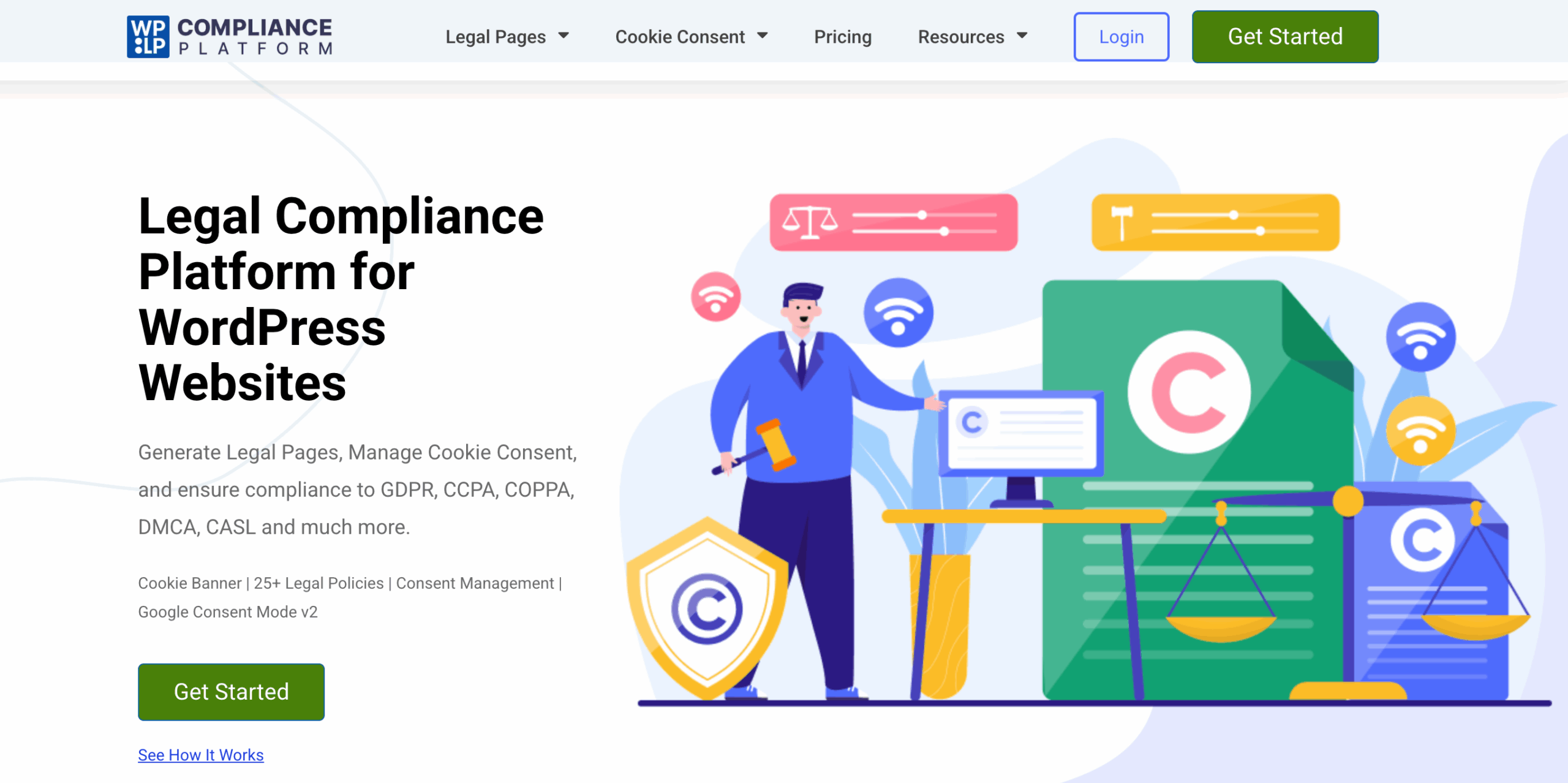
Florida’s privacy law imposes strict standards on businesses to use a resident’s personal data responsibly and ensure data transparency. Here is an outline of some of the key business obligations required by the Florida Digital Bill of Rights (FDBR).
Business Obligations Under Florida Privacy Law
1. Data Minimization and Purpose Limitation
- Personal data collected must only be for a particular informed purpose.
- Any processing of personal data will remain fair, relevant, and logically related to its original intended purpose.
2. Safety Controls
- Organizations must institute personal data security controls at the technical, administrative, and physical levels.
- Such controls must be commensurate with the volume and degree of sensitivity of personal data stored.
3. Non-Discrimination
- Businesses may not discriminate against consumers who exercise their privacy rights by increasing prices, reducing quality, or providing inferior services.
- Variations related to participation in loyalty, premium, or discount programs can be excluded as variations in price, quantity, or levels of service.
4. Privacy Disclosures
- Florida data privacy law requirements must be met with the websites’s disclaimers and privacy policies.
- The Terms of Service page of your website should also be transparent and adhere to FDBR rules.
- Ranking criteria for search engines must disclose any political affiliations that affect the order of search results.
5. Surveillance Restrictions
- Hardware with face recognition, voice recognition, or recording functionalities should not be monitored when not in use.
6. Retention Policies
- There should be a retention schedule that ensures personal data is erased once the purpose is met, the contract ends, or after two years of no contact with consumers
- Exemptions are available for in-house usage and the delivery of the products or for correcting errors.
7. Consent Issue
- Consent should be obtained before processing sensitive personal data.
- For children aged 13-18, consent can be provided directly by the child; for children under 13, COPPA rules require verifiable parental consent.
- Obtaining Explicit Affirmative Consent – Sales of sensitive data must obtain explicit affirmative consent and should not employ dark patterns.
8. Consumer Request Responses
- Answer consumer requests in 45 days, with a 15-day extension if the consumer is notified on or before the 45th day.
- Consumer Complaint Appeals have to be handled within 60 days.
- Businesses may direct consumers to correct data themselves if a self-service correction mechanism is available.
- Notify consumers once their requests have been fulfilled and process two free requests annually per consumer.
9. Data Protection Impact Assessments
- Regular assessments must be conducted to evaluate high-risk processing activities, such as handling sensitive data, data sales, targeted advertising, or profiling.
- Records of these assessments must be kept confidential.
10. Contractual Obligations
Create contracts with a data processor and third parties detailing roles, responsibilities of data processing, duration of processing, and compliance with the Florida Digital Bill of Rights.
Ensure that your third parties have confidentiality and regulation obligations.
11. Consumer Request Mechanisms
Provide at least two accessible methods for consumers to make privacy-related requests.
Provide an opt-out and appeals mechanism that is secure, reliable, and verifiable.
Compliance with these regulations will allow companies to comply with the FDBR while still maintaining consumer trust and privacy.
Penalties and Fines for Non-compliance of Florida Digital Bill of Rights (FDBR)
Under the Florida Digital Bill of Rights (FDBR), violations are treated as unfair or deceptive acts or practices in trade or commerce. The Department of Legal Affairs is authorized to administratively impose a penalty of up to $50,000 for violations.
Increased Penalty Amounts for Certain Violations
The penalty amount shall be tripled for any of the following violations:
- Targeting victims who are minors less than 18 years old.
- Not deleting or correcting personal information, after requested by a consumer.
- Selling or sharing personal information with third parties, after consent withdrawal by the consumer.
Enforcement Agency Discretion
The enforcement agency can provide a 45-day cure period for violations to be cured. If the violation is cured, there will not be a legally enforceable action taken. The enforcement agency can also send the entity a guidance letter, informing the entity that cure periods will not be extended in the future if a violation occurs.
No Individual Private Right of Action
Any violation under the Florida data privacy law cannot be enforced individually by taking legal action. The designation of the enforcement agency to enforce the law is binding.
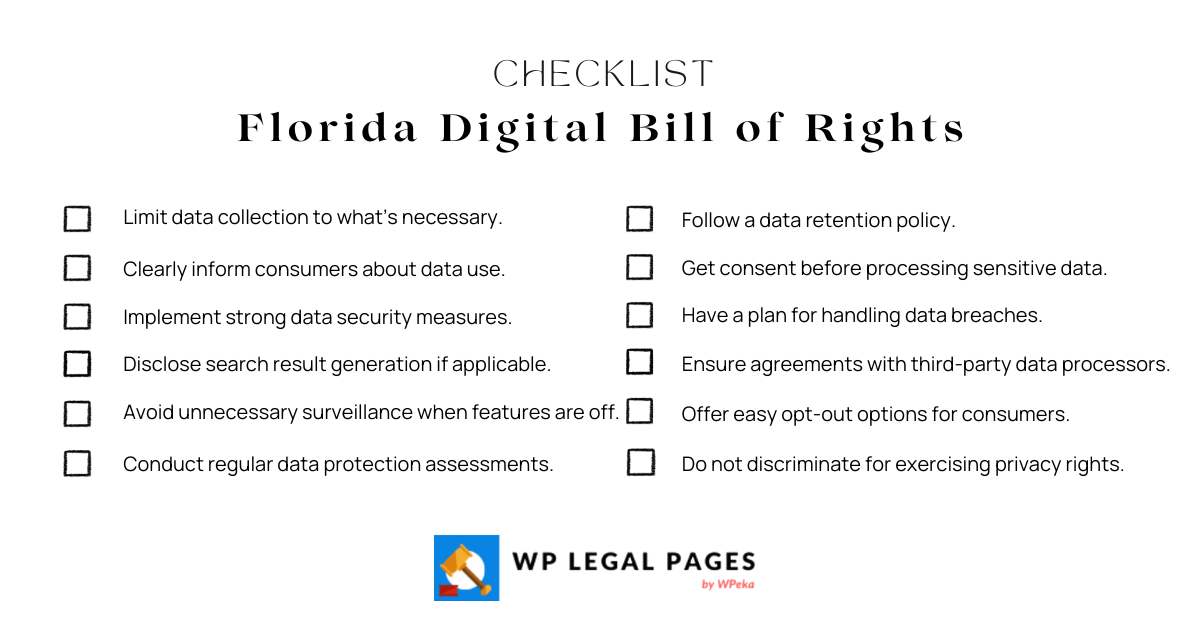
Using the WP Legal Pages plugin, you can create a targeted privacy policy for your website. It needs to include information like the types of personal data you collect, how they are processed, and which rights the user has under the FDBR.
In addition to this, use the WP Cookie Consent plugin which allows you to have options for discussing data collection consent by cookies one a transparent basis. This way, it meets the FDBR transparency and opt out rules.
FAQ
The Florida Digital Bill of Rights (FDBR) officially became effective on January 1, 2024. From this date, businesses operating within Florida or targeting Florida residents must comply with its provisions to avoid penalties.
Under the Florida data privacy law, sensitive personal information includes categories like health information, which includes medical histories or treatments; biometric information, such as fingerprints, facial recognition information, or voiceprints; and financial information, including credit card information, banking information, or any kind of transaction history.
Small businesses, as a rule, are not covered by the FDBR unless they exceed certain thresholds, such as raising more than $1 billion in annual worldwide revenues, or if they are conducting significant data processing operations, such as direct advertising or maintaining high volumes of customer data. This means that only substantial operations are obliged to comply with the FDBR.
Yes, FDBR reaches businesses outside the state of Florida whose businesses processes covered personal information about Florida residents or whose business offers services or products for direct and targeted transfer to the residents of the State of Florida. That is quite a broad scope in order to protect data of Floridians.
A consumer, if believing his rights under the Florida data privacy law are being violated, can file a formal complaint with Florida’s Attorney General. Although the law does not provide for private cause of actions, the Attorney General’s office is authorized to investigate and enforce penalties against violators.
Conclusion
Florida businesses had until July 1, 2024, to become compliant with the Florida Digital Bill of Rights (FDBR).
While many organizations may already have an advantage if they are complying with other privacy laws, Florida has its own unique provisions, including specific issues related to child privacy and minimum thresholds for compliance.
The reality is that privacy-by-design should be the new normal to incorporate strong privacy measures in business processes; creating a stronger level of compliance and consequently a stronger level of trust from users.
In order to create positive compliance, they need to close examine all Florida data privacy law requirements and implement crayons and tools such as consent management platforms and notification tools, which can help streamline notifications and opt-out processes for consumers.
As technology becomes more sophisticated, we should expect to see the Florida data privacy law also become more sophisticated to accommodate things like facial recognition and voice technologies, and all of their future developments, while regulatory revisions and case law will also become clearer.
As noted, very few organizations are likely to properly interpret the Florida data privacy law, therefore legal or data privacy professionals need to be engaged in this process, to ensure full compliance and trust building, which ultimately strengthens customer relationships.
Protecting privacy in a proactive fashion is not just a legal/regulatory issue, but a pathway to long-term business sustainability and continued growth.
If you liked reading this article, don’t forget to read our other engaging articles:
- General Data Protection Regulation (GDPR)
- American Data Privacy and Protection Act (ADPPA)
- The Ultimate Guide to GDPL: Brazil’s Data Protection Law
Are you ready to take the lead in safeguarding data privacy on your website? Grab WP Legal Pages Compliance Platform now!
